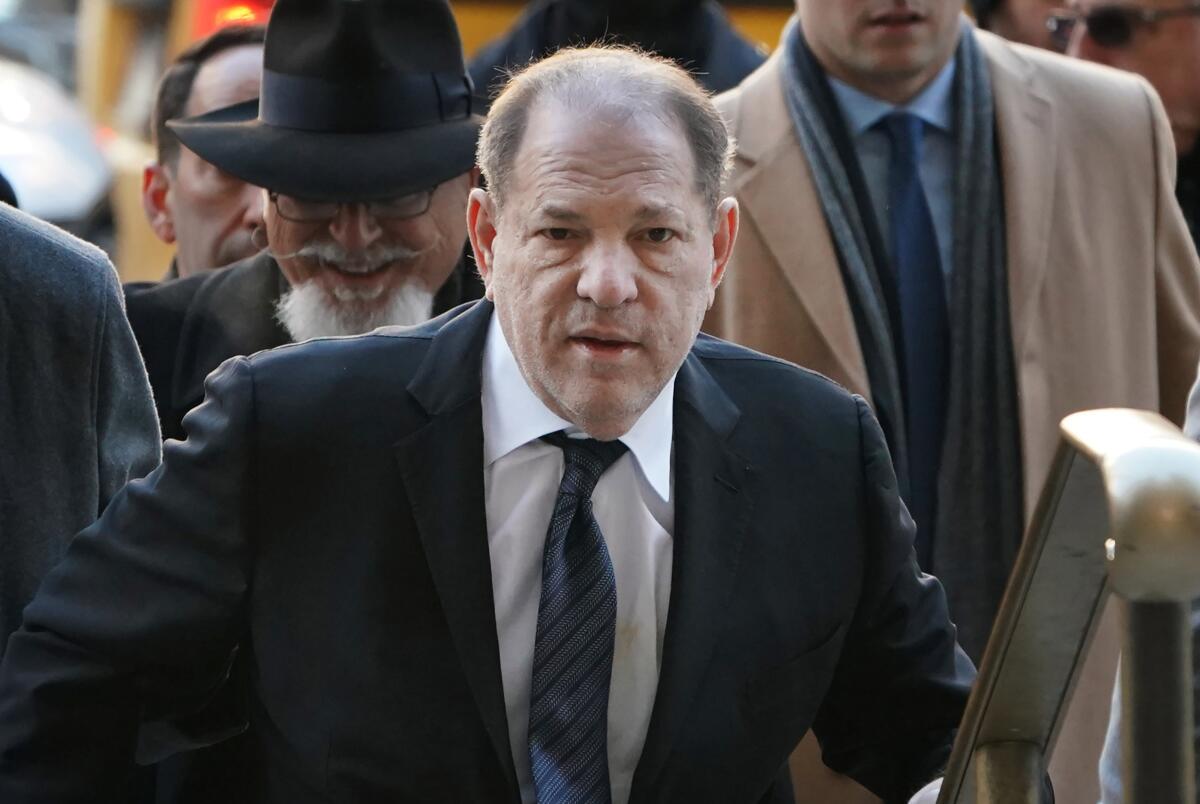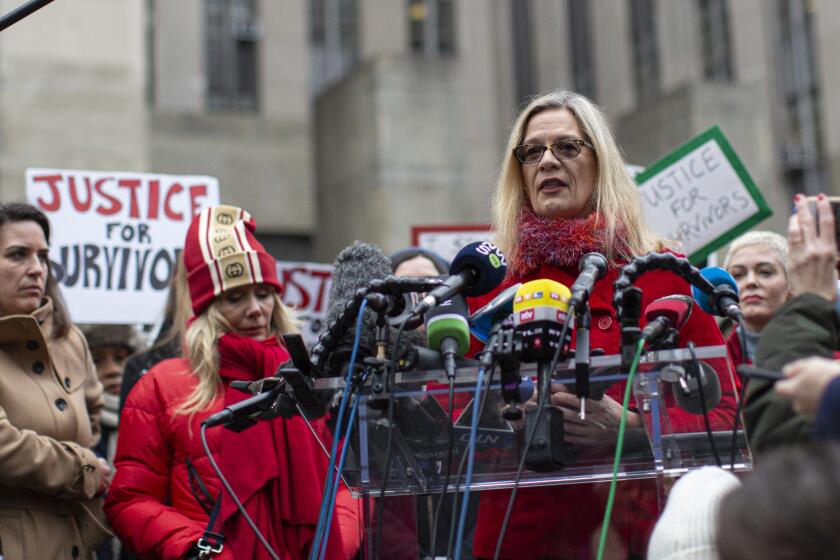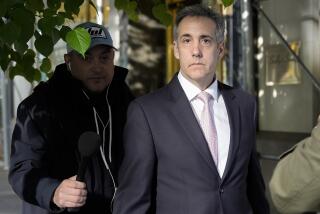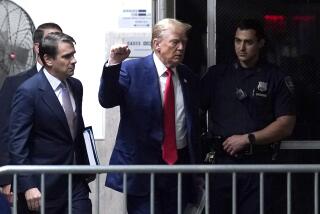Harvey Weinstein trial begins in dramatic fashion with graphic descriptions of alleged attacks

- Share via
NEW YORK — More than two years after a torrent of allegations against Harvey Weinstein helped launch a cultural reckoning on sexual misconduct, the fallen Hollywood mogul sat in a New York courtroom Wednesday and listened as a prosecutor laid out the case against him in graphic terms.
For 90 minutes, Manhattan Assistant Dist. Atty. Meghan Hast used at times cringe-inducing language to describe the experiences six women say they suffered at Weinstein’s hands.
For the record:
6:20 a.m. Jan. 23, 2020An earlier version of this article indicated the trial for Harvey Weinstein began Monday. It began Wednesday.
While the specifics of many of the accusations had been made public before, having them laid out in such stark detail in open court marked a historic moment in the #MeToo era and a dramatic start to a trial with far-reaching consequences.
With the typing of dozens of reporters acting as something of a metronome, Hast told jurors that prosecutors will prove Weinstein groomed young aspiring actresses into targets for his sexual advances, exploiting his former physical prowess to prey on them in hotel rooms if they refused, then using his status as a Hollywood kingmaker to assure their silence.
“You will come to see that the defendant kept his rape victims close, as close as he could, to make sure that they wouldn’t report,” Hast said. He would “assault and then immediately reach out to make sure that his calculations were right … that he had gotten away with it.”
As blunt as Hast was in establishing the basis of a criminal case that could send Weinstein to prison for the rest of his life, the mogul’s attorneys were just as direct in trying to undercut those accusations.
Damon Cheronis spent more than an hour displaying text messages, emails and other snippets of conversations between Weinstein and some of his accusers that highlighted a playful, almost loving, rapport with some of the women who say the mogul raped them.
“You don’t call Harvey Weinstein a predator in 2020 when you wanted to introduce him to your mother in 2008,” Cheronis said. “You don’t tell him that you love him in 2016, that you’re tired of being a booty call in 2017, and call him a predator in 2020.”
Former movie mogul Harvey Weinstein’s trial on sex crime charges is set to begin in New York in a case that rests on the credibility of his accusers.
For all the evidence previewed during daylong opening statements in a room full of international media and powerful attorneys, it appears Weinstein’s fate could come down to how 12 New Yorkers interpret his accusers’ behavior after their alleged assaults.
Hast sought to preempt the defense’s attacks on the correspondence between the women and Weinstein, telling jurors they should not make assumptions about how rape victims are supposed to act after an assault. Given Weinstein’s status in Hollywood, many of the women probably feared that challenging him would be the death of their careers.
“When these women take the stand during this trial and tell you about … their relationships with the defendant and the night that he violently sexually assaulted them, keep in mind who Harvey Weinstein was in the world these women work [in],” Hast said.
Weinstein, 67, is charged in New York with first-degree rape, two counts of predatory sexual assault, one count of first-degree sexual assault and one count of third-degree rape. The charges stem from an alleged 2006 attack on Mimi Haleyi, a former employee of Weinstein’s production company, and a 2013 assault allegation levied by another woman, described Wednesday as an aspiring actress from Washington state.
Several other women are expected to testify about alleged attacks by Weinstein over the past decades, including Annabella Sciorra, a Brooklyn actress whose case is too old to prosecute. Dawn Dunning, who previously made claims against Weinstein in a 2017 interview with CNN, also was identified in court Wednesday as someone who will describe another alleged attack that was outside the statute of limitations.
Two other women, including a Pennsylvania native whose allegation is part of the basis of criminal charges Weinstein faces in Los Angeles, will also testify. They were identified in open court Wednesday, but The Times is not naming them because they have not come forward publicly like the other accusers.
Hast went through each woman’s accusations in harrowing detail, laying out the arc of each one’s relationship with Weinstein — from meeting him with hopes of getting a big break in film or TV to living in fear of a man who boasted of his status and relationships with some of the country’s most influential people, including former President Clinton.
Twice, Hast described women as surrendering to Weinstein when he forced them onto a bed, lying “like dead fish” just hoping the attack would end. Another woman, whose identity had not been made public before Wednesday, told prosecutors that Weinstein dragged her across a room screaming as he claimed she “owed him one more time” before raping her after she told the mogul she was in love with her boyfriend, Hast said.
Cheronis was quick to contend that the women’s descriptions had gone largely unchallenged and told the jury that the defense planned to scrutinize their tales in a respectful manner, pushing back on criticisms that the mogul’s counterarguments will consist of “victim shaming.”
“We are not victim shaming,” he said. “‘Victim’ is a conclusion that is only made after a trial.”
The allegations against Harvey Weinstein are now set to culminate in a trial that is undoubtedly a landmark case for women’s rights. But despite the potential for a life sentence, advocates contend that the trial is just one milestone in a long crusade for systemic, lasting change.
As clearly as Hast laid out each woman’s story, Cheronis attempted to find holes in each narrative.
Haleyi, he said, had consensual sex with Weinstein after the date of the alleged rape. In the case of the woman accusing the mogul of assault in New York in 2013, Cheronis pointed to a number of “notes” she had written on her cellphone describing Weinstein as a “casual boyfriend.”
Cheronis also said he had proof the woman attended several movie premieres as Weinstein’s guest after the alleged assault.
“You can lie to the state. You can lie to the police. You can lie to anybody. But you can’t lie to yourself,” he said of her notes.
The allegations were detailed in a Manhattan courtroom packed with dozens of reporters from across the globe and powerful figures like Manhattan Dist. Atty. Cyrus R. Vance Jr. — whose office has faced criticism for failing previously to prosecute Weinstein — and attorney Gloria Allred. Reporters and members of the public lined up as early as 4 a.m. in below-freezing temperatures outside the courthouse’s Centre Street entrance hoping to guarantee access to the hearing.
Those who came late spent hours in a queue outside Judge James M. Burke’s 15th-floor courtroom, hoping to snag a seat if someone surrendered theirs or violated rules on cellphone use. At least one woman in a press row earned herself a trial-long ban when she was evicted by court officers for stealing a glance at her screen Wednesday afternoon.
The defense closed the day by offering two long-shot motions for a mistrial that were dismissed without discussion by Burke. Testimony will continue Thursday. While it remains uncertain when Weinstein’s accusers will take the stand, Hast made clear that the trial will serve as a chance for them to finally raise their voices louder than their alleged rapist’s.
“Although strangers to one another, they will each describe to you their fear, their shame and their humiliation, that they each wrestled with following their violent encounters,” Hast said. “Each feeling small and insignificant, no match for the power broker in Hollywood.”
More to Read
Sign up for Essential California
The most important California stories and recommendations in your inbox every morning.
You may occasionally receive promotional content from the Los Angeles Times.












